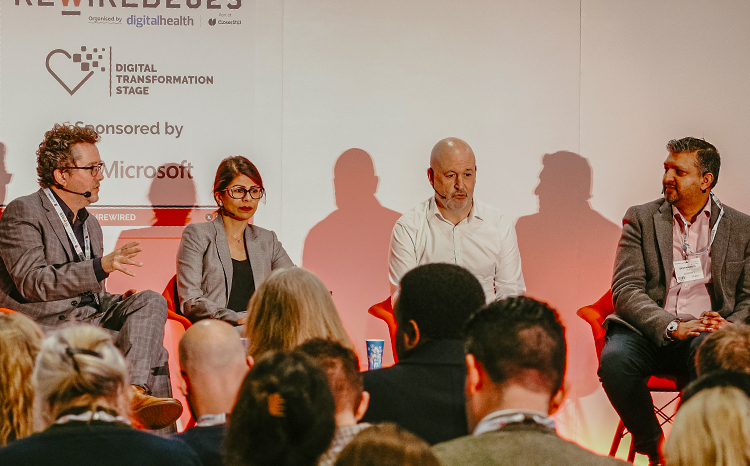Breaking down borders
- 23 April 2012

NHS Cumbria has a vision of an interoperable healthcare system – in which all the clinicians involved in the care of a patient can see their relevant health data.
Leading the project to make the vision a reality is NHS Cumbria’s chief clinical information officer, Dr William Lumb.
He believes that while paper processes could sustain old ways of doing things, a digital record is needed to support the move towards a modernised NHS structure and new ways of delivering healthcare.
His “grand plan” for IT services in Cumbria started to take shape in 2008. The aim of the project was to migrate services to EMIS systems and have the majority of organisations streaming information via EMIS Web.
It also set out plans to invest in a community of interest network; develop a hosted GP system; and develop an interoperability network involving community services, acute trusts and out of hours services.
Two thirds of the area’s 91 GP practices are now streaming via their EMIS systems, while the remaining INPS practices stream via Healthcare Gateway’s medical interoperability gateway, which provides a view of the patient record to other organisations such as out-of-hours providers.
The system only provides a clinical view, so people can not alter the shared record and certain information, such as sexual health, is automatically blocked.
At a recent conference to outline progress, Dr Lumb said there were just a few practices that had not signed up to share their data.
“You can’t take a group of GPs in a single line together, so work with the one third who wants to work with you, get things going, and then work towards critical mass,” he advised an audience member who said GPs in his area were against the idea of data sharing.
Write records with care
One GP who was on board from the outset, and who now leads the project in Carlisle, is Dr Alan Edwards. “I can’t see how we can deliver on the agenda of the NHS without this information sharing; that’s what we told our primary care trust and that’s how get got a project manager’s time and my time,” he explained.
Dr Edwards’s practice uses INPS, which is uploaded in real time to the MIG. The aggregated data is then presented in an embedded view for those using out-of-hours system Adastra, while staff in the primary care assessment service can also view it.
Dr Edwards said this means that GPs have to make sure that everything written in the patient record is appropriate and that they are prepared for other people to read it. Free text is currently not included, but will be turned on over the next couple of months.
Business and performance manager Lisa Sewell impressed attendees when outlining the MIG project timeline, which kicked off for 13 practices last April and was completed in August.
She said staff had visited each practice to talk through any issues and explain how this project differed from the National Programme for IT in the NHS. Patients were also given the opportunity to opt-out of the shared record scheme, with the majority of opt-outs made by NHS staff.
All on the Web
EMIS Web Community has been rolling out to community services in Cumbria since September 2010, with 75% of services now live.
Cumbria Partnership Trust head of clinical systems applications, Lin Kendall, said these services previously used a mix of paper and electronic administration systems.
One service had 16 different systems for managing the patient, which were not interoperable or capable of sharing high quality data, so there was no single view of the patient available.
When considering whether to move on to EMIS Web, services were asked to think about the number of times information was being recorded, the security of that information, and the opportunity for errors to be made because information was not in the right place at the right time.
Kendall said the electronic patient record saved time for clinicians who no longer had to fill out different forms for reporting purposes, because the information could be pulled directly from the system. Staff used a set of codes agreed by clinicians to report on common problems across the county.
Patient consent is gained verbally for an episode of care, which clinicians have agreed to be 90 days, and access to records is regularly audited.
IG is not a barrier
Conference participants came from as far afield as Scotland and the Channel Islands. Programme lead and director of Castlerigg Consulting, James Blacklock, said there was a “massive sense of frustration” among the day’s 250 attendees that similar work was not being done in their own regions.
“There is recognition that interoperability is required. Clinical commissioning groups want it because they can see improvements in care, clinicians want it because it improves care and makes their life easier, but these artificial barriers are thrown up and projects are delayed,” he said.
Attendees in a number of sessions said they were often “shot down” as soon as they started a conversation about data sharing, with “naysayers” arguing that information governance rules would prohibit it.
However, the Cumbria team argued that information governance was enhanced by storing information electronically and the IG team had been an enabler, rather than a barrier, to their project.
Cumbria Partnership NHS Foundation Trust head of information governance Yvonne Salkeld’s said IG was improved by the use of electronic records.
She said if a NHS device was lost it would be virtually impossible for anyone to access patient information, while the lack of paper also lowered the chance of notes being lost.
She explained how each service had an information asset owner and adherence to data standards had been built into the system. Data control remained with the referring organisation, so the GPs retained control over their own information, she added.
As each new community service comes online, groups of GPs decide how much clinical information needs to be shared with them and the service decides what information to share with the GP. This has resulted in hundreds of information sharing agreements which will be reviewed after two years.
Cumbria GP Brad Cheek said that now that the project is off the ground, Cumbria is starting to look at the quality of data being shared between services.
“As we share more information it becomes increasingly important that the data is good and the structure of the data is good, that’s a challenge we are just starting to address in Cumbria,” he explained.
He related the experience of out-of-hours staff who found the shared record hugely useful and “extremely popular with patients”, who no longer had to repeat their details at every new organisation.
He was looking forward to the day when he will be able to view his patient’s future appointments and send messages to other health professionals through the MIG, such as asking a district nurse to take bloods at their next visit.
Cheek predicted that systems that were not interoperable would not survive in the new NHS world.





